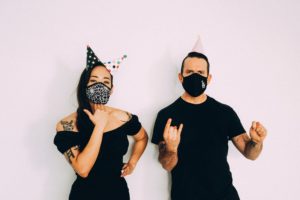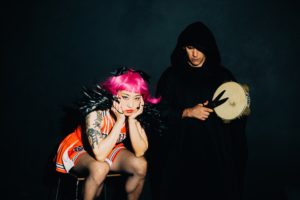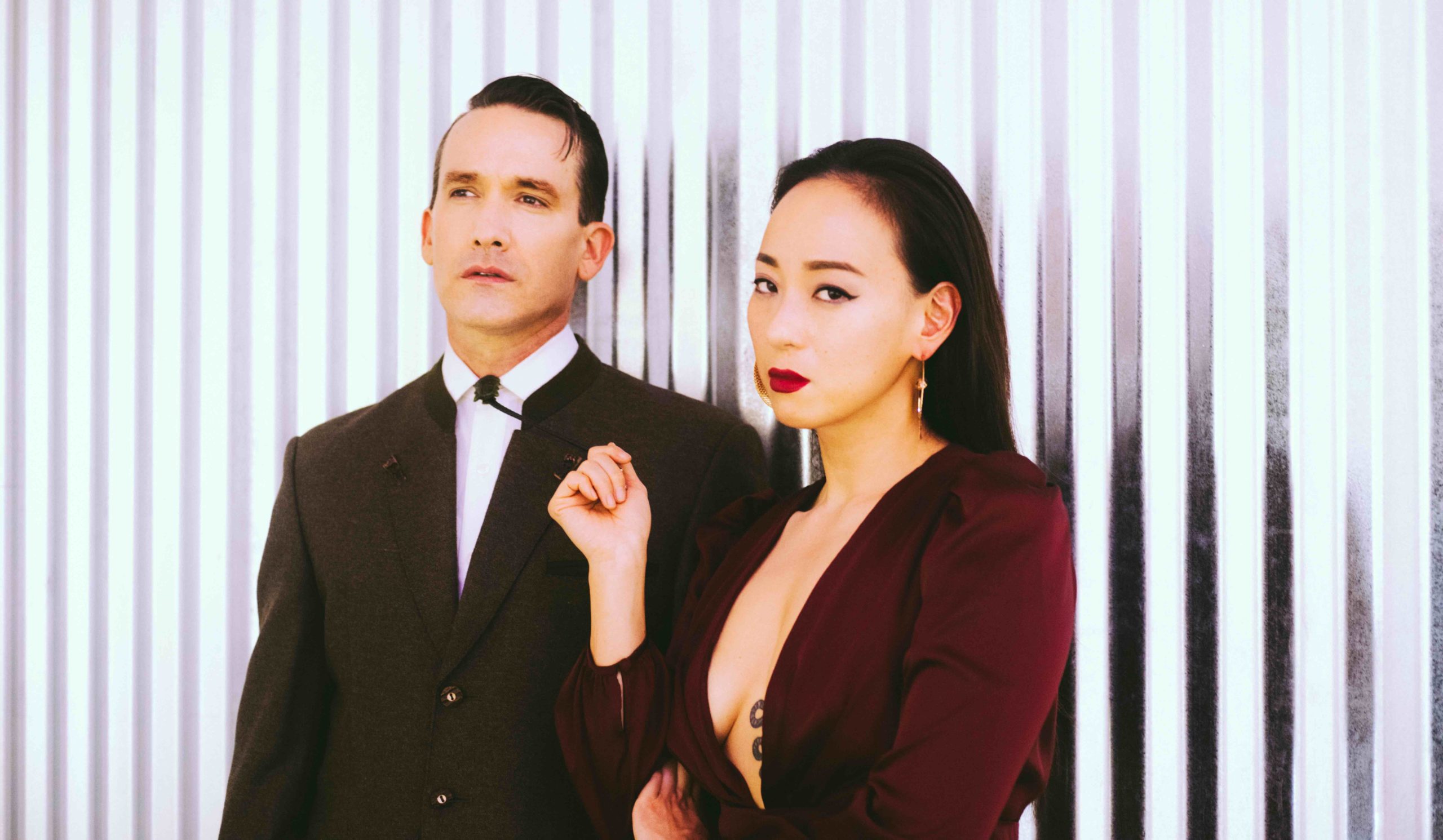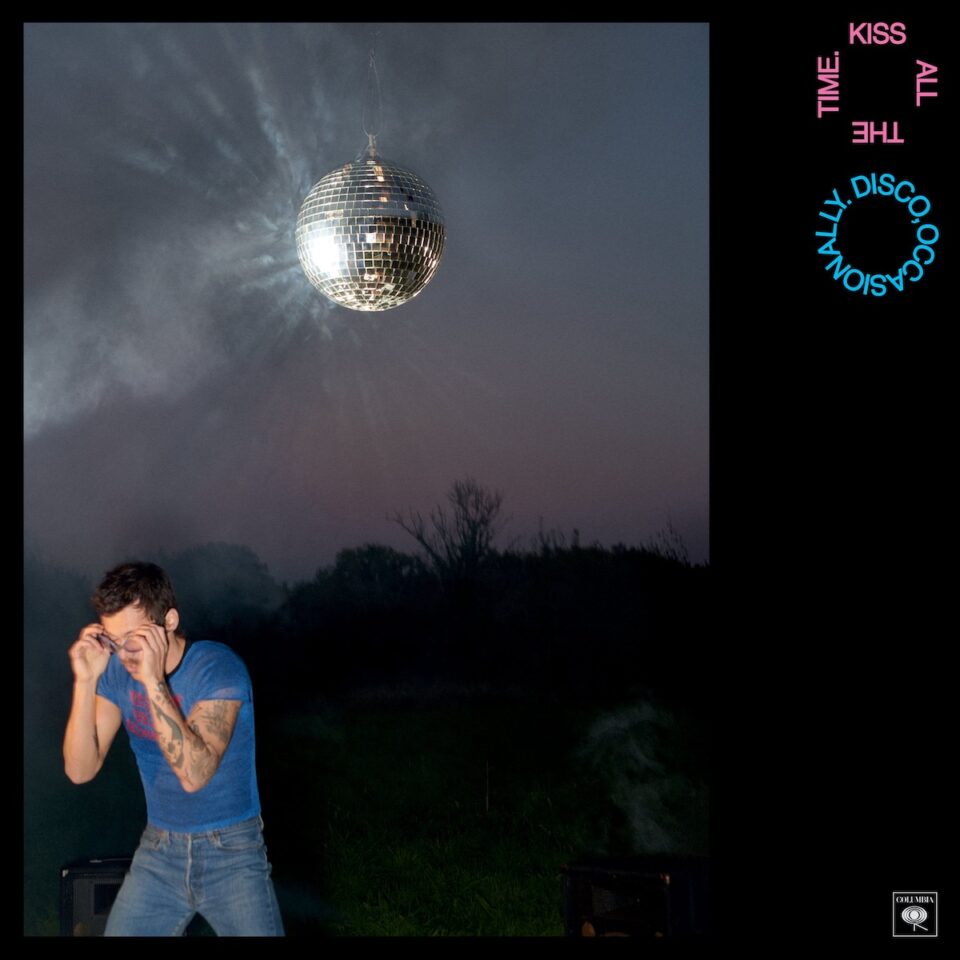Xiu Xiu frontman Jamie Stewart has a pin on his guitar strap that reads “I HATE PEOPLE.” Not long ago, the Los Angeles–based artist had some clear and justified reasons for wearing it proudly. In an unfortunate period of coincidence, Stewart suffered several personal and professional betrayals that left his mental health at a distressing low point. The band announced a temporary hiatus and tour dates were cancelled. The future of the group, and Stewart’s wellbeing, was in a worrying limbo.
A rivulet of well wishes from fans of the long-standing experimental group flowed in response, as one would expect from a fanbase as devoted as Xiu Xiu’s. Stewart—who has been the one consistent band member since their 2002 debut album Knife Play—is known for making music that is manic, tender, punishing, empathetic, funny, and heart-shattering. The band has been a wellspring of inspiration and comfort for lovers of outsider art across the world for two decades and counting.
Thankfully, Stewart eventually bounced back thanks to an outpouring of supportive messages he received from friends, acquaintances, and collaborators, some of whom he’d not spoken to in years. In fresh form, Stewart, alongside bandmate and friend Angela Seo, have returned with a new album of duets with guest vocalists called OH NO. The duet structure serves as a gesture of thanks to those who showed him good will, even when he wasn’t looking for it. The result is one of Xiu Xiu’s most lush and intoxicating albums to date.
In good spirits, Stewart spoke to us over the phone in his and Seo’s Los Angeles home to discuss the power of surprise, his disappointment with contemporary music, and the best restaurants in LA.
What spurred the idea to do an album of duets?
There was a period—which is still kind of going on—where several people I was very close to personally, for lack of a better description, fucked me over or betrayed me in pretty significant ways. They weren’t related. It was just a coincidence that it was a large number of people in a short period of time. I don’t deal with stress very well, and that amount of negative experiences led me to have a nervous breakdown.
During that time, unexpectedly, a lot of people I hadn’t heard from in several years and several close friends took special pains to check in on me and make sure I was doing OK. I don’t really like people generally, I’m not very social. I’m a pretty crabby and negative person. But the amount of generosity and kindness that people were showing me when I wasn’t looking for it but really needed it got me back on my feet quite quickly. It was a reminder which I very much needed that there are obviously horrendous, shitty people in the world, but most people are actually pretty decent.
The idea to do a duets record was to try to service the symbol of gratitude I felt toward that kindness and to say thank you. To duet is to make something with another person, which is not my normal inclination. I feel really lucky that the universe handed me exactly what I needed at that time.
“To duet is to make something with another person, which is not my normal inclination. I feel really lucky that the universe handed me exactly what I needed at that time.”
As is usually the case with your music, there are a lot of very personal lyrics on this record. For example, “I Dream of Someone Else Entirely” seems to touch upon familial trauma. How did you and Owen Pallett connect on an emotional level for that song?
For me, that song is very specifically about childhood trauma. It’s about the effects of trans-generational abuse and the similarities between how my parents have reacted to both being brutally abused as children and the two of them abusing myself and my siblings—not to the degree that they were, thankfully. Over time and generations, we’ve all dealt with abuse.
Owen and I are old and very close friends. We’ve shared a number of difficult intimacies with each other. I knew this song in particular, because it’s so specific, wouldn’t feel right unless it was with someone I trusted. Owen is someone I could talk to about these things directly and he wouldn’t be thrown by it.
What was the recording process like? Was it all done remotely, or were there some in-person sessions as well?
Sharon Van Etten and Alice Bag were both in-person. Alice Bag was the first one we did, actually. Angela has a whole song, and we share a house together, so that was obviously in-person. But everybody else was remote—partially due to the pandemic and partially due to distance. It’s certainly not the most fun way to make a record, but it’s increasingly a normality.

Although it would have been exciting to be in the room with people, I think it turned out better doing it from a distance because they were able to be freer. If you’re doing someone else’s song in front of them, it’s kind of impossible not to do what you think they want. If that person’s not in the room, it’s easier to relax. Like I mentioned before, being surprised is what I look for most in music and I had no idea what to expect from anybody, and that’s exactly what we wanted. Without exaggerating, in every case, everyone went above and beyond what I assumed they would do. I feel quite honored by the amount of hard work people put into it. I’m not saying that to be nice. I genuinely feel this way.
“Being surprised is what I look for most in music and I had no idea what to expect from anybody, and that’s exactly what we wanted. Without exaggerating, in every case, everyone went above and beyond what I assumed they would do.”
There are plenty of lyrics on this album that have inflections of isolation and despair, but at the same time, a lot of the production is some of the most lush that’s ever been on a Xiu Xiu album. What inspired this sound, and would it be fair to call this Xiu Xiu’s most hopeful album?
Oh, um, not to me [laughs]. I want people to have their own interpretations, so if that’s what you’re getting from it then I’m incredibly glad that A) you’re getting anything from it, and B) that your interpretation is different from mine. I do agree with you that the production is on the more lush side. A lot of the artists that influenced this album, that’s what their records sound like, so I’m not surprised.
“Rumpus Room” is one of your most fun tracks ever—
I would normally wanna barf if someone said there was a fun Xiu Xiu song, but I think that’s a pretty fun song [laughs].
It’s undeniable! There’s a bar in the Lower East Side in Manhattan called “Rumpus Room.” Did you know about that?
I did know about that. I haven’t been there, but I’ll go next time I’m in New York! The idea for the name came from an empty studio that Angela and I had in our house that used to be a doctor’s office. It’s now Angela’s office, but prior to that it was just a spare, fun room called the Rumpus Room. Initially, when she moved in, there was just a pink throw rug and a very tiny ottoman in the shape of a sheep. It was just a room to go in with friends to get drunk or do drugs or whatever. It became a sort of portal to misbehavior. A lot of coo-cooness has occurred in there.
What made you want to cover The Cure’s “One Hundred Years,” and what made you choose Chelsea Wolfe as your match?
The Cure is, at this point—this is a horrible term, but—a quote-unquote legacy band. They were one of the first bands I came to as a kid. It was just before Nirvana, so there was still a real delineation between “alternative music” social groups and mainstream culture. Now everyone listens to everything, but in the early ’90s, what you listened to defined you as a person and who your friends would be. That’s sort of true today, but not as much as when I was young.
The Cure led me down the path to getting into more far-out music, and they’re still one of my favorite bands. They’re a deep part of my musical skeleton. During my freakout, I listened to a lot of music to try to pull me out of it and The Cure was a part of that. “One Hundred Years” is obviously one of the least comforting songs in the entire world, and when it came out in 1982, its doomy nihilism was incredibly relevant. Unfortunately, 40 years later, it’s just as relevant in terms of imminent destruction of humanity.
I actually don’t know Chelsea all that well—we were acquaintances, and I made the assumption she felt the same way about the song. She seemed like someone who could sing it and have no camp involved in any way. The song is obviously extraordinarily over-the-top and in no way tries to be knowing or classy. It deals entirely in feelings of hopelessness and doom and is unapologetic about it. I knew she was someone who would be unhesitant about that aspect of the song.
“There’s no motivation to do anything different. Now, there’s a motivation to do something that people will like. Aesthetic success more than ever is based on pleasing someone in the short term. “
Is that what you mean when you say some people may find it silly?
If you’re at the grocery store and see goth kids buying Cap’n Crunch, it looks funny [laughs]. But becoming goth as a reaction to suburban life is not funny. It’s completely rational and beautiful to make one’s body a confrontation against the bullshit of conservatism and capitalism.
You mentioned earlier there are perhaps less stark allegiances to certain types or aesthetics of music than there used to be. Do you feel any nostalgia for more distinctly aestheticized and delineated musical times?
This isn’t based in nostalgia—this is going to sound a little heavy-handed, but it’s based in fact. The current period of ultra-amalgamation and total, constant access to everything, is not helping art or music in any way, if you just look at it empirically. People don’t know how to deal with everything all the time. There’s no effort to learn anything about aesthetics or music or any delineation between them. There’s no motivation to do anything different. Now, there’s a motivation to do something that people will like. Aesthetic success more than ever is based on pleasing someone in the short term.
The nice thing about being a musician is you have friends of all ages—some of my friends are 18 and some are 65. My friends who are 20 who are real music fans are bummed out about how shitty new music is right now, that it lacks a certain amount of interest or depth. I think a lot of that comes with people not knowing how to deal with the current technology. If people figure it out, maybe it’ll get good again. I don’t feel nostalgic for that period, I just—on a practical level, as someone who loves listening to new and exciting records—feel fucking bummed out that we’re at a low point right now. But we’ll figure it out and get past it. There’s no way people could put up with this much shitty music for that much longer.

photo by Julia Brokaw
There isn’t much information out there about the featured artist Valerie Diaz on closer “ANTS.” Can you tell us who she is and why you wanted to bring her on?
We’re just pals socially. She’s not in the music world. On the cover of the record are two eyes, and those are on a sign on a salon I pass by during the drive to her house. The poem [she recites] comes from me getting very, very stoned one night and I just said it into my phone. Valerie’s from Coney Island and has a delightful accent and I knew she could say the poem in a wonderful, sweet voice.
I’m also a big fan of Werner Herzog and one of his tenets is it’s not only fine but encourageable to include things that are out of context in the larger context of what you’re working on if it occurs in that moment. Even if you can’t articulate it, if it feels like at the end of this record there should be a short poem about ants, then don’t think about it, just include it. It’s a nod to Herzog as much as it is to Ms. Diaz.
What are some restaurants in LA you like to take out-of-towners to?
Both Angela and I love to eat, and we both grew up in Los Angeles. The last five years there has never been better food in LA, ever. There’s a Oaxacan place in Koreatown called Guelaguetza, an udon place in Little Tokyo called Marugame Monzo, a pizza place called Pizzeria Mozza, an ice cream shop called Big Softee, a Chinese vegetarian place called Vege Paradise. LA’s a funny town in that it’s so spread out, so driving 45 minutes to go to a restaurant is not an unheard of thing to do because the food here is so good. These are some I would definitely make that trip for. FL







